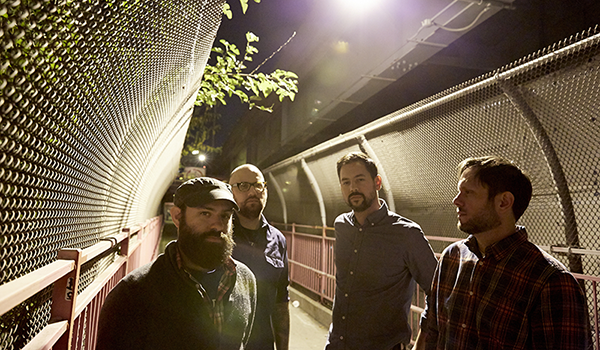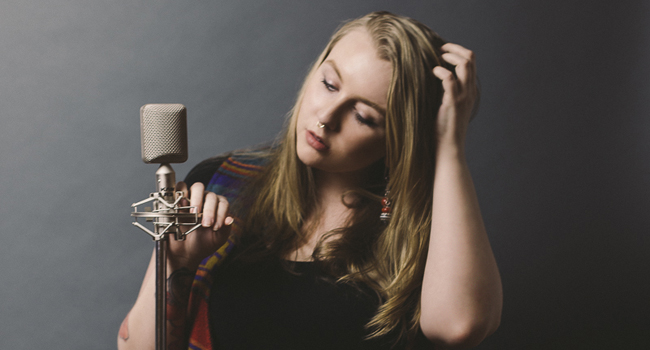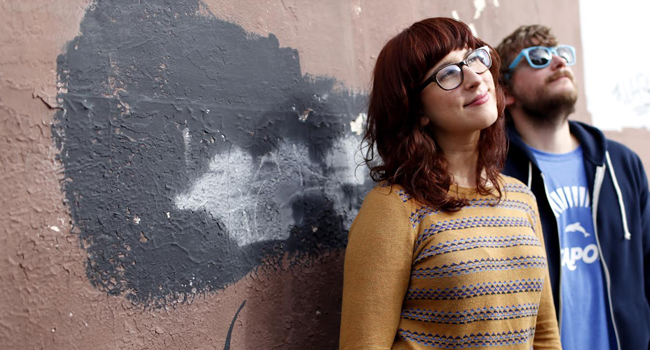There’s a long list of bands from the late ’90s to the early 2000s that flew under the radar while contributing to the foundation of what people now call, for better or for worse, the “emo revival.” The Jazz June was not only one of those bands, but one of the better ones. Pop ‘stache sat down for a Skype session with Andrew Low, vocalist and guitarist, to talk about the good ol’ days, the present day, and everything in between.
Pop ‘stache: Are you based out of London now?
Andrew Low: Yeah, I’ve been here about eight years now.
P’s: How did that happen?
AL: I had the opportunity to move here through my ex. I used to be married to a British girl, and then I got like a visa through her, which basically meant I could live here and work… I can’t vote, but for life now, I can live here. It’s called a “definite leave to remain” visa. Basically, we were together in the States and we decided to move here and it was easier, because we were married. It’s really hard to move between countries unless you’re married or like a super fucking engineer that has a skill no one else has.
P’s: How often do you make it back to the States?
AL: A lot, lately. My brother lives in Hoboken, which is just over the river from NYC so we’ve played a lot of New York shows. I think this year I’ve been back three or four times, which is good, because we’ll make money off a show and that’ll pay for my ticket. It’s expensive, so if I didn’t have that I’d probably only come home like once a year in February when it’s the cheapest airfare.
P’s: Any Chicago dates lined up?
AL: Not anything we have planned, but I can’t imagine why not. We just went to Austin. We’re doing a little tour over winter break in D.C., Philly, Boston, and New York City. We’re trying to hit each major place at some point in the next year. Hopefully we’ll play a festival in Chicago and we can make our way all over the place.
P’s: At what point did you see potential for The Jazz June to enter what people are calling the “modern emo scene?”
AL: About two years ago Bryan [Gassler], who was the other guitarist, was like, “Guys, we’ve been talking about this for six years, like, let’s just write some new music.” So he put on Facebook, “Hey, we’re gonna record some new songs.” And then the Topshelf [Records] got in touch with us and we started to find out that there was an actual “emo revival.” People started listening to that type of music again and writing music in the same vein again, and it was very much sort of like, “Oh shit, this is cool.”
It was really cool, because when we sort of stopped playing—and this isn’t why we stopped playing—but when we stopped playing a lot, in like 2003, you needed a booking agent to manage the show, whereas now it feels more like people doing it themselves and it’s not as professional and mainstream. It’s more DIY again. There’s obviously still managers and PR agents— Topshelf is a totally professional label—but it’s just two dudes, as opposed to when there was all sorts of crazy shit going on. We wanted to play new music anyway, and when we started to see a kind of scene we could exist in again without having a manager or a booking agent, we were like, “Yeah, let’s do this,” because there’s obviously cool stuff going on right now, and we were comfortable re-entering that scene again.
P’s: Were you familiar with Topshelf Records before they reached out to you?
AL: Not really, especially, because I’m in London—there’s a few other bands, like, Nai Harvest is from Brighton—I just wasn’t connected to that scene. I’m still totally connected to the music and stuff, and I have certain websites that I read all the time, but unless you’re going out to gigs and hearing bands it’s harder to catch up with what’s going on.
P’s: How was Evan Weiss of Into It. Over It. involved in making the new record?
AL: He produced it. Bryan was on a work trip in New York City and he went to see Evan’s other band called Their / They’re / There with a friend of ours. His name is Tom, and he runs Washed Up Emo. Anyway, Tom took us to this gig where we met Evan and it just so happened he was available and knew a studio in New Jersey.
He was great because he’s a sort of virtuoso on guitar, bass, drums, everything. I don’t think it was like a typical Hollywood L.A. producer who sat in the back like, “Do another take,” you know, “Give me the magic this time!” [Laughs.] He did backup vocals on loads of songs, too. He is such a fan of that kind of music that he immediately knew what sound we wanted. Instead of saying, like, “Hey we want this to sound like Pavement,” or, “Do you know this one obscure record? That’s how we want this guitar part to sound!” he just knows and can play stuff so it was really awesome to have him there with us.
P’s: The guy’s a networking genius, too.
AL: Yeah, and he has a really unique style of music. He writes technically proficient music, but it’s still melodic. That opens it up to a big audience. He doesn’t alienate anyone because he’s got so many different elements to it, and obviously he’s a nice guy that’s always touring, so he’s done well for himself.
P’s: Do you feel any attachment to the word “emo?” Does that label do the band justice?
AL: Looking back on that now, it was a time when people were doing something a bit different, so people didn’t know what to call it. I think “emo” was a word that was tagged to it for someone writing about it, like a journalist. To me it was all “post-punk.”We were all in straight-edge hardcore bands, or punk rock bands, and at some point, we wanted to play something that wasn’t as heavy and wasn’t as angry, but we were influenced by many of the old hardcore bands, so our music was sort of heavy anyway. I was just singing instead of screaming.
P’s: Do you have any relationship at all with the other bands that are going through this resurgence? As in, do you ever see Bob Nanna or someone and give him a high-five, like, “Hey, this is crazy, right?”
AL: [Laughs.] Yeah, definitely. We played with Knapsack and Mineral this weekend, and Mineral sold out this place called the Mohawk. I remember seeing the guy from Knapsack saying, like, “Wow, this is just like the old days except back then there were 10 of you here and we were in, like, Boise, Idaho, and it was a Tuesday night and no one knew who we were.” And now they’re sitting there playing in front of 1,000 people. It’s definitely a trip. When we started The Jazz June we were just like, “Wouldn’t it be cool to… play a gig?” [Laughs.] We were just doing it because we really liked it and had no intensions whatsoever.
Funny enough, I did see Bob Nanna when we played with Braid. It’s cool to see those types of people again, who we might’ve only played with two or three times ten years ago, but automatically we reminisce.
P’s: Do you think there’s a new generation of fans has emerged because of new recordings and shows?
AL: It’s the same age group as when we were first playing. So when we played CMJ [Music Festival], most of the people in the audience were students, probably 21 or 22, and they liked us and knew Mineral and probably went to see American Football, but they also know the newer bands. Like, the World, uh… is a… Lonely… uh…
P’s: “The World is a Beautiful Place and I Am No Longer Afraid to Die.”
AL: [Laughs.] Yeah, I think what’s happened is that some of these bands have gotten a lot of attention, so fans looked into it and found out there are other bands that influenced them. I don’t know what people listen to in their bedrooms, but the people who are actually physically in front of you are like 21, 22-year-old girls and boys, which is good, because it used to be all dudes. It’s good that girls are into it and feel comfortable at the shows, because it used to be, again, like a hardcore thing where girls didn’t want to get stomped in the face, but this is a totally different thing.
As far as the band is concerned—have you heard Field Mouse yet? They’re a really good band. We’re playing four different shows with them over winter break. We’re hoping to get to South By Southwest this year as well, and possibly places like Chicago and cities we haven’t been to in years. And hopefully the West Coast because the West Coast has always been so much fun. We also have a video for “After the Earthquake. And we’re trying to play as many shows as we can physically with me being in a different country, and hopefully getting those guys up to the U.K. and stuff.
P’s: That’d be cool.
AL: Yeah, and then write new music as well. Now that we figured out how to write music online, it’s pretty easy. If I have a guitar part, I can just email it to them and they put their parts to it then we edit, change it, talk about it; just like we would if we were in a practice studio.
P’s: There were emo bands that flew under the radar but had a following, and they’re coming back and can have this whole new world of fans. But there were the bigger bands, your Dashboards, your Hawthorne Heights; I can’t see them doing anything similar. Maybe those fans aren’t fans for life.
AL: Yeah, you get a girlfriend and you’re like, “I’m not so sad anymore.” [Laughs.] I think you’re right. Now is a funny time because I remember going to Krazy Fest which is a festival held in Louisville each year put on by our old label Initial Records. Hot Rod Circuit kept like this packaged tour and they all had these huge vans. They were like, “Dashboard Confessional is playing after you.” I’d never heard of him. It was like, how do all these people know his music but I’ve never heard of him? I mean, he was probably around in a local band for years, but he just got huge for a second. All of the sudden he was this huge superstar and everyone knew his songs and he didn’t have that time going on the road and making fans and personally meeting people. This isn’t his fault, he just got so famous so quick that there was a fucking barrier between him and the fans. And the only way you could meet him was if you went to the signing afterward and you’d get two seconds to talk to him, instead of him staying at your house and meeting all your friends.
So I think that’s probably what happened to a lot of bands. They just got famous so quick that it became harder to connect with people and make them a lifelong fan.
P’s: People that want to listen to this kind of music are going to seek it out and do a lot of the work for you. The Internet is a powerful tool we’re all still figuring out how to use. How does that impact the band?
AL: It was great at first, especially with MySpace. It never happened to us or anything, but you could put out a song and all of the sudden have 20,000 followers. That’s a great thing, the viral sharing. It actually does cost money to get your song on the radio, you have to have an agency working for you unless you’re just really lucky and it’s the most catchy song in the world, you have to pay someone who knows all the music directors to play it and then you can get heard. But if you’re just a band that’s starting out and you don’t have any of those assets or those people, you don’t get that access.
We don’t play very often so if we have a new song out then the only way people are going to know is if we put it on social media. We’re not in front of their faces announcing stuff, so that’s the only way we can get stuff out when we can’t do tours in every city. But it’s fun, it’s cool, it’s a lot easier than it used to be— you used to have to mail a postcard to everyone on your mailing list if you were going on tour or hope that the promoter handed out a flier for the show and then people came to see you. Now I can tell someone in Brazil that we have a new song out on my phone, so it’s easier. Obviously there are a million bands on the Internet, but it’s still helpful.
P’s: It’s a good problem to have.
AL: Yeah, totally. It’s great because you can hear bands you might not have heard of before because you didn’t have the money, and now you can hear everything you’d ever want to in the world. It’s good for music fans. It’s not great for the record industry.Unfortunately, record labels exist to, if not make money, at least make back the money that they’ve already put out so they have to do whatever they can. Then it become not, like, “Hey, we wanna spread the word.” I mean, people who like us, they’re like working for us for free. They’re like, “Hey, have you heard this new record? You’ve got to hear it!” I do that all the time. But then as soon as it becomes a matter of how much would you pay to let your friend hear it and hope that he would buy it back from you. It’s a totally different thing.
P’s: There’s a lot of talk about how low Spotify royalties are a big problem. Do you know anything about that potentially influencing the band?
AL: Things like that for a band like us don’t actually matter. Someone like Taylor Swift probably looks at it and sees it’s an outlet that they’re not making money off of, whereas radio or even YouTube you would make money, because you’re able to put an ad before your song. So, as far as revenue is concerned, someone like Taylor Swift— who’s already gonna get a million people listening to her every day—thinks fuck that, there’s so many other avenues where I could make money.
I want people downloading songs, not necessarily for free, but for us it’s great because I could send a link out and hope that people like it and share it who haven’t heard us before, and that might be the only way they’d hear about it. And maybe then they’ll buy a t-shirt, or come see us live, or maybe they’ll want vinyl. To us, it’s like those kind of platforms are just a way to get people to hear us and that’s what we’re most concerned about, getting people to hear us. It’s a bummer, it’d be great to get paid, but that’s not necessarily what we’re concerned about.
P’s: Right.
AL: It’s a necessary evil. But again, it’s a free platform, it’s not like there’s an alternative that we would get paid on. It’s funny, too, because even people my age who grew up buying records before the Internet, I’ll say, “Yeah, I’ve got a new record out!” They’ll say, “Yeah, cool, when’s it gonna be on Spotify?” Y’know, they’re not like, “Oh, great, I’ll get one from you!” [Laughs.] Even my friends. It’s like, “No, dude! Buy the CD!” But again, they can listen to it and maybe they’ll come to the next show.
P’s: Do you think listening to one or two tracks at a time versus an entire album is a problem?
AL: I don’t think so, because I’ve always been a huge fan of 7-inch [records] anyway. There’s loads of bands where I only have their 7-inch. I mean, considering our new album, I definitely would like people to listen to it from start to finish, because we’ve arranged each song in a way that we think is a good sort of pace. But if they’re just gonna download one single and listen to that, I don’t have any problem with that. It doesn’t take that much effort, though. It’s only a half an hour long! [Laughs.] They’re gonna live to be like, 80, so if they can’t spend half an hour listening to our record then… But I think it’s more just that people give out singles for free. Then again, if someone downloaded the single for free and it didn’t inspire them to buy the album, then maybe they just don’t like us and they never were gonna listen to it. Maybe we’re just not their cup of tea.
P’s: Makes sense. Comes back to an audience thing, I guess.
AL: Definitely. I think people who are into us are into a lot of other bands that we used to play with and are playing with now, so they’re just fans of the genre, which is cool. Those people will come and see you every time you’re in town, and you might even get to meet them, you know what I mean? I’ve met people who’ve just been on Twitter like, “Hey, I’m coming to see The Jazz June,” and I’m like, “Yeah, stop by for a beer!” and then we’ll hang out and I’ve made a new friend.
P’s: Is there a band that you’d like to see reunite, like a dream influence that could potentially come back?
AL: Guided By Voices I love and have loved for a really long time. They did get back together for about six years. They were supposed to come over to the U.K. and then the singer, I think, went into rehab, and then they were supposed to play the festival that we played last weekend but they broke up right beforehand so I never actually got to see them. But I’d love to because I’ve heard they’re the most fun band to see live. A lot of times they’re chucking beers into the crowd, and they’ve got such a huge back catalog of so many great songs that they’re a band that I’d love to reunite again so I could see them. Who knows, it’ll probably happen. They’re pretty old, though. [Laughs.]
P’s: What’s your favorite Guided By Voices record?
AL: Well, I think Alien Lanes, Bee Thousand. Lately I’ve been listening to Isolation Drills, which I think is their most produced record. Oh, and “Let’s Go Eat the Factory” is another new one. I started with Spotify’s “best of” and I just go to that and go through and listen to whatever my favorite song is on the “best of” then I go and listen to the rest of that album. But there is just so much of it that even an album like Alien Lanes which has one of my favorite songs on it, “Game of Pricks”—that whole album is like 15 songs and some of them are just fucking weird. I think he put out every song that he ever wrote without having any sort of quality control. He put out, like, four a year! There is so much of it that it’s hard to wade through and find the gems.
It’s such a cool story about how he started the band when he was 30 or whatever and just continued to put out his own records and finally got picked up and now he’s in one of the bigger bands in the genre. It’s a really inspiring story. The music business is tough, and it’s always been tough to create a following, but obviously if you keep doing it then eventually you’ll get good at writing songs, and you’ll get more fans, you just have to keep at it. So when you’re depressed and all, “Oh I’ve been doing this for so long and I’m not famous,” it’s like, well… You could be. [Laughs.]
P’s: Right, right.
AL: You gotta keep doing it.



